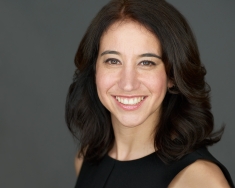
In 2000, when Kathy Ehrich Dowd graduated with a degree in journalism, she had her sights set on becoming the next Barbara Walters. For nearly two decades, she thrived as a reporter and editor, including an impressive 17-year run contributing to People magazine followed by a three-year stint at Time magazine. But what began as a passion for telling people’s stories, such as the families and victims of 9/11 and the Newtown school shooting, eventually led to burnout. Then came the pandemic, and with it, a turning point.
Dowd, who had always been interested in people’s inner workings, decided to pivot. She enrolled in a single social work course while working part-time and raising two children. “I still wanted to have that interpersonal interaction,” she said. “But rather than interviewing people and writing about them, I wanted to try to help them.” With the support of her family and a growing sense that her journalism skills could evolve into something more healing, she began her journey toward a career as a social worker.
Why Rutgers?
For Dowd, a New Jersey resident, Rutgers School of Social Work was the obvious choice. “It’s a well-respected school right in my backyard,” she said. Rutgers' flexibility sealed the deal. Its range of course formats and scheduling options allowed her to pursue her degree while balancing parenting, part-time work, and practicum requirements. “I love that there’s in-person, hybrid, and online learning options, and the cost compared to other programs made it a no-brainer.”
She also appreciated the diversity of the student body and the opportunity to study at the Newark campus, close to her home in Maplewood. “The diversity is not in name only. People come from all different backgrounds, and everyone has overcome so much. It’s incredibly inspiring.”
Practicum That Changed Everything
Dowd completed two practicum placements during her time at Rutgers School of Social Work. Her first, at the Family Service Bureau of Newark, gave her direct experience with clients struggling with anger, trauma, and mental health challenges. She facilitated group sessions and saw firsthand the power of building trust in those she served. “The most challenging clients were the ones I learned the most from,” she shared.
Her second practicum placement was one she sought out herself, and it changed the course of her future. She connected with a practice offering ketamine-assisted psychotherapy, which led to a practicum placement—and now, a job—at Acheron Psychiatry in Manhattan, a trauma-focused private practice. In the fall, she will begin seeing individual clients and hopes to eventually lead groups and practice couples’ therapy.
A Transformative Educational Experience
Beyond coursework, Dowd enriched her education through Rutgers’ Certificate in Interpersonal Violence and Trauma (C-IVT) program and through a life-changing study abroad experience in India. Alongside faculty and fellow students, she visited an organization supporting sex workers in Kolkata. “It was eye-opening and humbling. Traveling with a group of social workers was like going to sleepaway camp—everyone was so caring.”
Courses like Clinical Social Work and Social Work and Spirituality stood out to her. She even wrote about how psychedelic therapy can induce spiritual experiences. Her favorite assignments were case studies and role-playing opportunities, which helped her reflect deeply on real-world client interactions.
Advice for Career Changers
Dowd knows what it’s like to leave behind a career that’s become part of your identity. “My biggest advice: give yourself permission to evolve. You’re not giving up. You’re just growing.” She recommends starting with a single professional credit course to test the waters and stresses that Rutgers’ support systems and flexible structure make it doable, even for busy parents or full-time workers.
She also speaks candidly about the importance of self-care, a value deeply embedded in the Rutgers program. “I meditate almost every day,” she explained. “I pace myself. And I know my limits. I know nothing good happens for me after 9 p.m.!”
Looking Ahead
Dowd graduated in May with a 4.0 GPA and a sense of deep gratitude—for her fellow students, the professors who challenged her, and the career that lies ahead. As she steps into her new role as a clinical social worker, she’s committed to the core values of the field: empathy and unconditional positive regard for others.
“We need people who want to help others, not just in social work, but in the world. Social workers touch every part of society, and we need more recognition for that,” she said.
As Dowd continues her journey from storytelling to soul-healing, she exemplifies the spirit of what Rutgers School of Social Work teaches: compassion, resilience, and eagerness make a difference.



